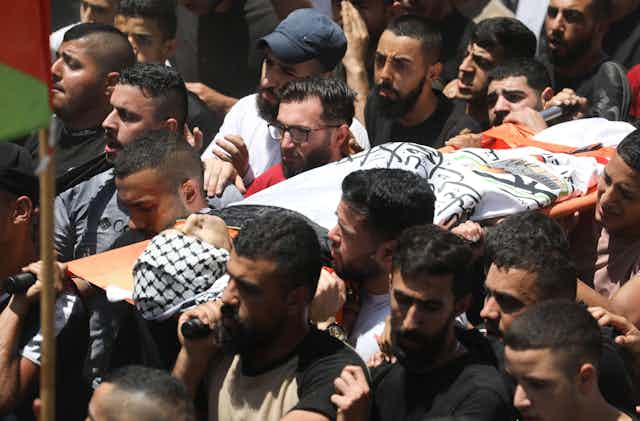Israeli forces say they have completed a 48-hour military operation in the West Bank city of Jenin – the largest in two decades. Beginning on Monday, July 3, the Israel Defence Force (IDF) hit the city with drone strikes, sending in hundreds of troops and bulldozing through the narrow streets. Two days later, 12 Palestinians were reported dead and 100 injured. One Israeli soldier was killed.
In what was billed as an operation to clear Jenin of terrorists, Israeli forces arrested Palestinian militants, seized weapons and neutralised improvised explosive devices (IEDs). The operation caused widespread damage to Jenin’s crowded refugee camp, which is home to 14,000 people in less than half a square kilometre – most of whom are descendants of Palestinians dispossessed of their land and homes when Israel was created in 1948.
While the residents return to assess and repair the damage, two questions persist: why invade Jenin at all – and why now?
Why target Jenin?
Jenin has long been a central site of Palestinian armed struggle. During the second Palestinian intifada (uprising), 28 suicide attacks in Israeli towns and cities were reportedly planned and launched between October 2000 to April 2002 from Jenin.
In April 2002, the refugee camp in Jenin was attacked as part of Operation Defensive Shield, the largest Israeli military mobilisation in the West Bank since the 1967 war. A large section of the refugee camp was razed and it was reported that the Israeli military blocked humanitarian assistance to the camp. The UN reported that 52 Palestinians, up to half of whom may have been civilians, and 23 Israeli soldiers were killed.
The Battle of Jenin was for many Palestinians a “heroic symbol of resilience and resistance against Israeli rule”. Meanwhile, to many Israelis, the attack was seen as an attempt to clear out “a dreaded incubator of terrorism that has claimed many lives over the years”. These competing narratives have re-emerged in response to this current incursion.
The waning influence and capability of the Palestinian Authority in the area has created a power vacuum. This has enabled the emergence of local militant groups, including Hamas, Palestinian Islamic Jihad and Fatah – who operate from within the refugee camp.
According to IDF data, of the 290 attacks on Israelis emanating from the West Bank since June 2022, 106 came from Jenin. It has therefore been the focus of Israeli raids in the past year. Up to now, the IDF chief of staff, Herzl Halevi, has considered small-scale, targeted operations drawing from precise intelligence to be sufficient in managing the threat.
Meanwhile, Israel’s prime minister, Benjamin Netanyahu – narrowly re-elected at the end of 2022 – has not previously supported a full-scale invasion into the territory for fear of the potential reprisals. So why was this launched now?
A weakened prime minister
While the IDF was reluctant to risk being dragged into a lengthy and complicated ground assault, Israeli politicians had different considerations. The current coalition government of Israel includes several far-right, religious, nationalist parties who, alongside the settler movement in the West Bank, have been pressuring Netanyahu and the military command to take more decisive action.
Read more: Israeli elections: Benjamin Netanhayu set to return – with some extreme new partners
Bezalel Smotrich, who shares responsibility for the West Bank at the defence ministry, and Itamar Ben Gvir, the national security minister, have been fanning the flames of violence against Palestinians for months.
Ben Gvir called on the government to launch the military operation during a press conference in June, to “demolish buildings, eliminate terrorists, not one or two, but tens and hundreds, and if necessary even thousands”. This inflammatory rhetoric, alongside rampant settler violence and the approval of further settlement building in the West Bank marks a new phase in the Israeli occupation of the West Bank.

With Netanyahu in an increasingly weak position, the influence of the far right is increasing. The prime minister needs their support to keep him in the premiership. In return, he has bowed to their pressure.
The approval of the invasion by Netanyahu can also be viewed as an attempt to divert attention from his anti-democratic judicial overhaul, which has seen hundreds and thousands of Israelis take to the streets in protest. It may also be an attempt to unite an increasingly divided Israeli society, which tends to come together under the flag in times of crisis.
This is by no means the first time that the Palestinians have suffered as a result of Israeli prime ministers attempting to create distractions from fractious internal politics. But it’s normally the 2 million Palestinians living in Gaza who tend to bear the brunt of Israel’s assaults when domestic tensions are running high. Critics blamed an attack on Gaza in August 2022 as an attempt by the then government to appear hawkish as campaigning for the November election intensified.
To regain domestic favour and quieten his critics, perhaps Netanyahu has stepped over a line even he would not have crossed previously.
It’s uncertain at this point whether the attack on Jenin will be the first of more large-scale operations in the West Bank, or whether Palestinian resistance will erupt into a collective intifada. But history tells us that the cycle of violence will continue and neither the Israeli nor Palestinian leadership have the power, or will, to stop it.

